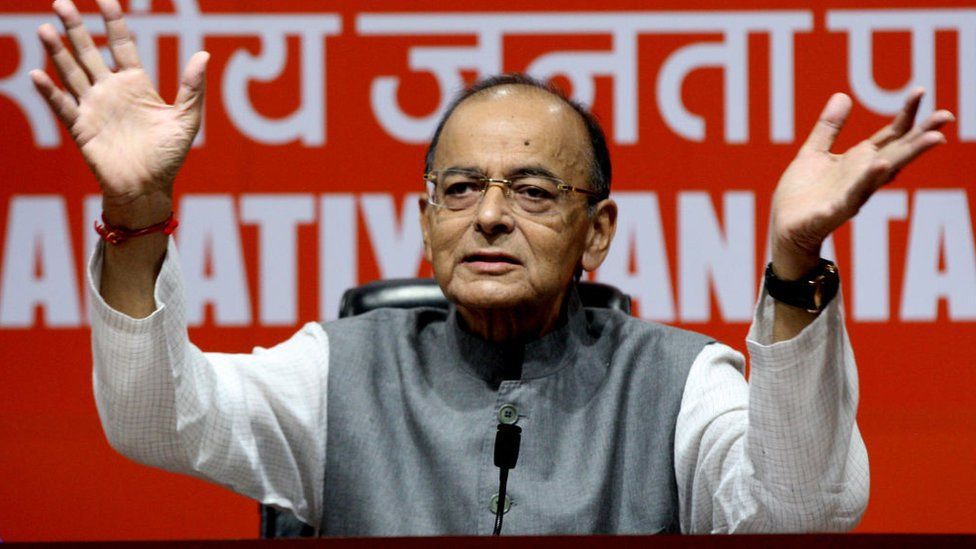Arun Jaitley: Former India finance minister dies
- Published

Former Indian Finance Minister Arun Jaitley has died after a long illness.
He was admitted to Delhi's AIIMS hospital on 9 August with breathing issues.
Mr Jaitley, 66, was a close aide of Prime Minister Narendra Modi, and a senior member of the governing Bharatiya Janata Party (BJP).
Paying tribute on Twitter, Mr Modi said that Mr Jaitley and the party "had an unbreakable bond".
"With the demise of Arun Jaitley Ji, I have lost a valued friend, whom I have had the honour of knowing for decades," he wrote.
"His insight on issues and nuanced understanding of matters had very few parallels. He lived well, leaving us all with innumerable happy memories. We will miss him!"
The BJP's bridge-builder
As finance minister during the BJP's first term, he was credited with a landmark goods and services tax bill - India's most significant tax reform since independence.
However, citing poor health, Mr Jaitley opted out of the BJP's second cabinet after its massive election victory earlier this year. He underwent a kidney transplant in 2018.
It was also under his watch as finance minister that Prime Minister Modi made an overnight decision to withdraw 500 rupee ($7.60) and 1,000 rupee banknotes from the financial system as part of a crackdown on corruption and illegal cash holdings.
The move sent shockwaves through the Indian economy, which relied heavily on cash transactions.
Mr Jaitley was also responsible for pushing through the Goods and Services Tax or GST, which subsumed a messy plethora of indirect taxes, duties and surcharges into a single tax.
What is India's GST and why does it matter so much?
A lawyer by profession, Mr Jaitley was active in campus politics in the late 1970s and became the president of the student union at the prestigious Delhi University.
He was among many activists who were detained when then-prime minister Indira Gandhi suspended civil rights and invoked a state of emergency that lasted between 1975 and 1977.
He was appointed as the country's additional solicitor general in 1989 and formally joined the Hindu nationalist BJP in 1991.
In 2002, he was appointed as the party's general secretary and one of its official spokesmen.
Mr Jaitley was renowned for having friends across the political spectrum. Therefore he would often be called upon to play the role of a mediator or act as a consensus builder when the BJP needed the support of other parties.
He was also known for his passion for cricket. Following the news of his death, some of India's most famous cricketers paid their respects online - including Rahul Sharma, Harbhajan Singh, and the team's head coach Ravi Shastri.
Virat Kohli, the Indian team's captain, tweeted that Mr Jaitley was "a genuinely good person": "He took out his precious time back in 2006 when my father passed away to come to my home and pay his condolences. May his soul rest in peace."
The cricket lover I knew
Nitin Srivastava, BBC News, Delhi
That he was a brilliant speaker, a dominating parliamentarian and legal hawk is well-known.
But what always struck me about Arun Jaitley was his fondness for exotic north Indian food and cricket banter.
Despite battling diabetes, he always ensured that visiting journalists were treated to lavish food and would often grab a bite from the platters with his trademark "who cares" wink.
During an election campaign in 2015 he once made me wait for almost 45 minutes in his hotel room for an interview because he was not very pleased with the three-course breakfast that had been served to us.
As we waited, he wanted to only talk about cricket, asking me, "Rohit Sharma or Virat Kohli - who do you think has the potential to make more test centuries when they eventually retire?"
He served as a minister of state for information and broadcasting in 1999 before taking additional charge of the law ministry in 2000 when he was also elevated to the rank of cabinet minister.
Mr Jaitley was also involved in cricket administration, and was appointed as the vice-president of India's cricketing body, the Board of Control for Cricket in India (BCCI) in 2009.
Mr Jaitley served as the president of the Delhi and Districts Cricket Association (DDCA), one of the country's most influential cricketing bodies, from 1999 to 2013.
He was accused of corruption during his tenure at DDCA, but no charges were ever proven against him.
He brought a defamation case against Delhi's chief minister Arvind Kejrwal after the latter alleged that there were financial irregularities at the DDCA during his tenure.
The case was settled after Mr Kejriwal tendered an unconditional apology.
Most recently, despite his "retirement" from active politics, Mr Jaitley had tweeted extensively, backing the government's decision to revoke the special status for Indian-administered Kashmir and addressing head-on many of the arguments against the move.
The controversial move had sparked sharp criticism from the opposition and some Indians, even as it drew widespread support from across the country.
Mr Jaitley called the constitutional provision guaranteeing Kashmir special status a "historical blunder", and praised Home Minister Amit Shah for achieving "the impossible".
- Published4 August 2016